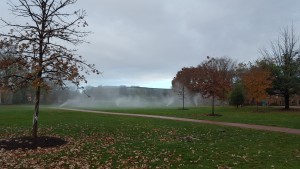I can’t believe I haven’t blogged about this yet, but last Saturday I had the glorious opportunity to return home. Not home as in New Hampshire, but home as in the sea. Each September, the Lafayette swim team (and this year the divers!) pile in cars in the wee hours of the morning and head to Belmar, New Jersey for a charity swim benefitting brain cancer research. It is important to us to support the swim team that puts on the event, but it is also a fun-filled retreat of sorts for our little tribe.
Anyway, so the “race” is a mile long ocean swim and it is absolute madness. In an attempt to coordinate the insanity, the race directors have competitors enter the water in “flights” but this just results in a frenzy of those in later flights literally trampling those who leave first. It is a thrashing, crashing, splashing, clawing brawl of bodies. It takes from 20-30 minutes but it feels like an instant because the entire event is a campaign for survival.
I love it.
It dawned on me this year that amidst this chaos, I felt supremely content. Swimming has always been an important part of my life, and so has the ocean, but only a few years ago did swimming (in an athletic sense more than a splashing-around-in-the-waves sense) become a passion for me. It is so vastly different from pool swimming, or even lake swimming. It is colder, obviously saltier, and so much more threatening. It is beautiful.
Usually when I go for a longer swim in the ocean, it is with the lifeguards I have worked with for many summers. We all enter at the same time and battle our way through the waves before we get just past the break and chart our own courses. It is far more independent than the ocean swim we participated in on Saturday. To enter the mindset in a hypothetically present tense:
I am entirely at the mercy of the single most powerful entity on this earth. I am intimately aware of my fragility and yet astounded by the willingness of the sea to cradle and rock me with each set of waves that rumbles toward shore.
This kind of experience is something I hope never to take for granted. Amidst the hundreds of flailing, violent, churning bodies a few days ago, I almost lost track of this feeling. But after a moment or two, I could surrender to the Atlantic, the beautiful Atlantic, and it didn’t matter how many scrappy boys scratched my legs or grabbed my feet, I was home.


